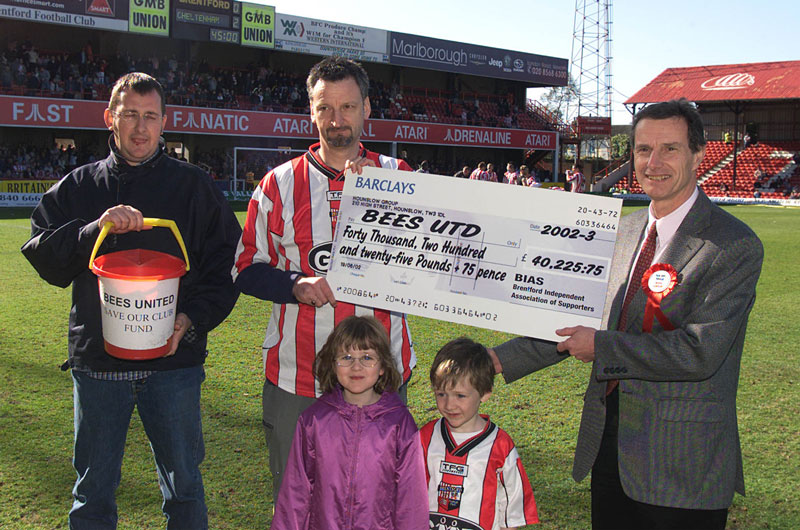Push Up Brentford! is a project set up and run by educational charity digital:works.
Working with historians, local archives and digital-works staff, this project trained volunteers in research skills, oral history interviewing and recording skills.
The project recorded 23 in-depth oral history interviews with fans, former players and staff of the club.
These full interviews are being given to the local archives, Brentford History Group and Bishopsgate Institute.
The interviews have been edited to make a documentary film to be shown at various screenings and broadcast on television.
The material will be used in workshops in local schools.
This project website houses all of the full interviews, the podcasts, the film and covers the progress of the project.
This project is run by digital:works with the support of Brentford Football Club, Brentford Football Club Community Sports Trust, Chiswick Library Archives and the Brentford History Group.
We are grateful to the National Lottery Heritage Fund for their financial support.
Title image from the "Brentford Reimagined" book available from Legends Publishing

digital:works has been running oral history projects across London working with communities to explore the history of work and workers in the capital. Projects so far include printers on Fleet Street, bus workers, underground workers, black cab drivers, jewellers in Hatton Garden, tailors in Saville Row, the Thames Lightermen, Thames boatyards and more. Other projects explore the history of Battersea, North Kensington, Southall, Eel Pie Island, as well as some of London’s indoor and street markets. If you would like to see any of these wonderful films and find out more about digital:works please visit:
www.digital-works.co.uk.
This project focuses on an oral history of Brentford Football Club at a time when it was about to move from its Griffin Park ground, home to the club since 1904.

The project focuses on the memories and experiences of the fans, the footballers and club staff of this unique community based club. The club has an exceptional history in London for its community involvement and has remained firmly rooted in the neighbourhood at a time when other football clubs have become much more corporate and, arguably, have become more distant from their fans. For example, in 1967, Queens Park Rangers planned to take over Brentford, move into its ground and close down Brentford FC. In response fans, players and staff created a huge and successful campaign to fight this. This fighting spirit to keep the club in the community has remained central to the ethos of both fans, staff and players. Examples include the "no to Woking" campaign when a club owner proposed to sell the ground for housing and move it 25 miles away. The ABeeC campaign was run by fans who actually stood and won local elections in order the get Hounslow Council to save the ground from housing development. The fans then established a trust which bought out the owner and ran the club for 6 years until a more sympathetic owner could be found. These crucial moments in the club's history have been recorded as part of this project. For 30 years the club has had a strong "football in the community scheme" - The Brentford Community Sports Trust - which has been committed to making links with local schools, supporting young offenders and other initiatives which have led the way in how a club can embed itself in the community. This commitment to the local community was also demonstrated by the club setting up one of the country's first blind supporters scheme with matches described by commentators directly to blind supporters in the ground.
In addition to this important heritage, this project has recorded the highs and lows of the club among fans, footballers and staff. The project's aims were to explore and reveal the stories of people's lives and, through them, reveal a deep social history of the club. The history of the club typifies much of the type of heritage that needs to be preserved, the every day experiences and struggles of people in London and to record what is important to them.
We know how important the heritage of the club is to fans. The role of the club in the community, the meaning it gives to their lives through relationships with the club and with each other, the relationships that develop over decades based on the weekly Saturday afternoon meetings on the terraces. And the campaigns over the years to retain that community connection and feel in the face of corporate take overs which, they think, would move the club away from the fans.
We have collected all these stories and make them freely available to the whole community.